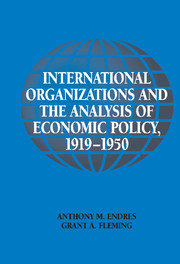Book contents
- Frontmatter
- Contents
- List of Figures and Tables
- List of Abbreviations
- Preface
- 1 Economics and Policy in International Organizations: Introduction
- 2 Business Cycles: Conceptions, Causes, and Implications
- 3 The Role and Conduct of Monetary Policy in the 1920s and 1930s
- 4 Public Investment Programs in the Interwar Period: Pre-Keynesian, Proto-Keynesian, and Keynesian Perspectives
- 5 Trade Policy Research: Geneva Doctrine and the Scandinavian Connection
- 6 Social Economics at the ILO: Scope, Content, and Significance
- 7 International Finance and Exchange Rate Policy
- 8 The Full Employment Movement from the 1940s
- 9 Conclusion
- References
- Index
Preface
Published online by Cambridge University Press: 29 July 2009
- Frontmatter
- Contents
- List of Figures and Tables
- List of Abbreviations
- Preface
- 1 Economics and Policy in International Organizations: Introduction
- 2 Business Cycles: Conceptions, Causes, and Implications
- 3 The Role and Conduct of Monetary Policy in the 1920s and 1930s
- 4 Public Investment Programs in the Interwar Period: Pre-Keynesian, Proto-Keynesian, and Keynesian Perspectives
- 5 Trade Policy Research: Geneva Doctrine and the Scandinavian Connection
- 6 Social Economics at the ILO: Scope, Content, and Significance
- 7 International Finance and Exchange Rate Policy
- 8 The Full Employment Movement from the 1940s
- 9 Conclusion
- References
- Index
Summary
This book is the culmination of eight years' research. It began with correspondence between the authors and Janie Gummer, the daughter of E.J. Riches, in 1993. Janie informed us that Riches, international civil servant and former ILO Deputy Director, was close to death and that some of his personal papers may be of interest to historically minded economists at the University of Auckland. These papers alerted us to the work of economists at the International Labor Organization. We were especially stimulated by conversations with A.W. (Bob) Coats when he visited the Antipodes in the mid-1990s; his unflagging enthusiasm for extending work on the intellectual history of economics to include the work completed by special cadres of economists and social scientists in both government and international agencies had a lasting influence, as the following pages attest.
The path to the final manuscript has been made easier by the wealth of comments from countless academic colleagues. We acknowledge the benefits of comments and conversations with conference participants at the History of Economic Thought Society of Australia conference (Freemantle), the European History of Economic Thought conference (Marseille), and two Economic Society of Australia Annual conferences (Canberra and Melbourne). More vigorous exchanges in seminars at the Australian National University, Duke University, King's College Cambridge University, University of Auckland, University of New South Wales, and University of Western Australia have sharpened our arguments and challenged our framework.
- Type
- Chapter
- Information
- Publisher: Cambridge University PressPrint publication year: 2002

